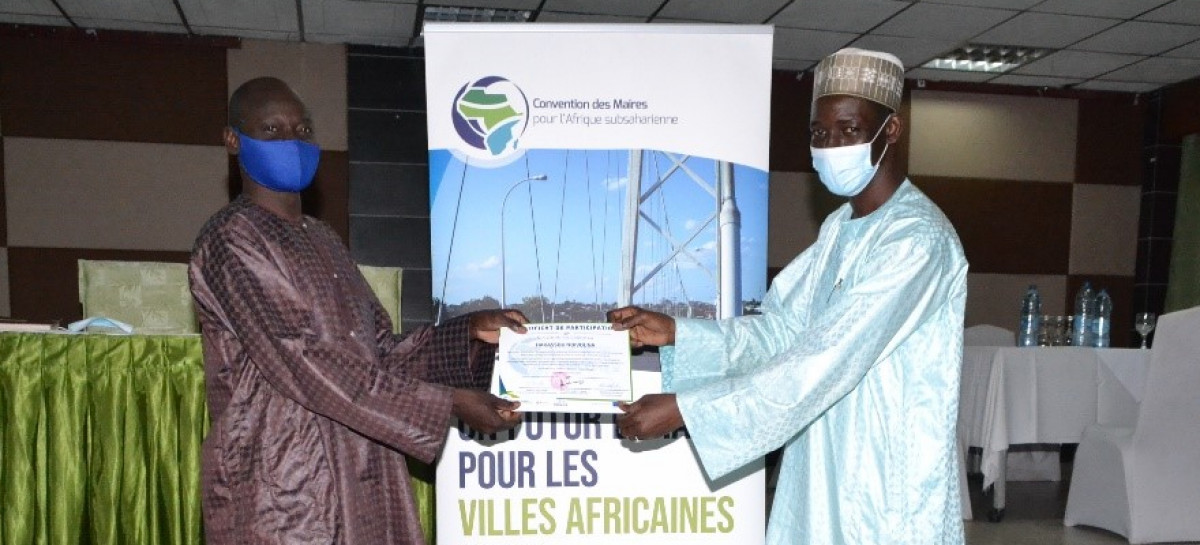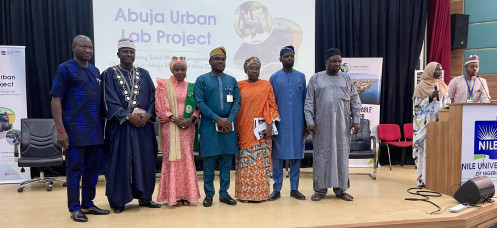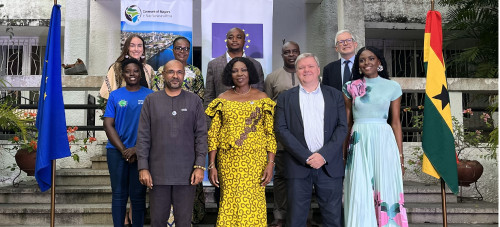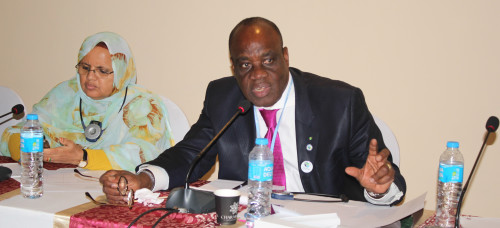Public lighting in Cameroon: Finding a balance between economy and ecology
Published: 27 May 2021

A training dedicated to strengthening the capacities of local actors in Yaoundé with a particular focus on renewable energies was organised by CoM SSA. Affordable solar solutions, stages of implementing public lighting systems, profitability, challenges, and monitoring mechanisms were discussed in an impactful three-day session.
According to a study by Cameroon's Ministry of Water and Energy (MINEE), the public lighting bill accounts for 55% of the State's total electricity expenditure bill. At the communal level, even if we do not reach the same proportions, public lighting, when available in municipalities, is expensive.
 Hence, the need to explore different technical, financial, and ecological options to reduce this energy bill and make it more affordable. Looking beyond financial issues, public lighting means more attractive, dynamic and safer cities for people.
Hence, the need to explore different technical, financial, and ecological options to reduce this energy bill and make it more affordable. Looking beyond financial issues, public lighting means more attractive, dynamic and safer cities for people.
It is in this context that a workshop on public lighting was held from 22 to 24 February 2021, with a particular focus on renewable energies such as solar energy. The workshop was co-organised by GIZ and the Special Fund for Equipment and Intercommunal Intervention (FEICOM) in the framework of the Covenant of Mayors in Sub-Saharan Africa (CoM SSA).
The training was restricted due to the COVID-19 pandemic to about forty local actors (mayors, municipal councilors, and municipal technical experts) from a dozen of municipalities. It was intended to facilitate the understanding of public lighting projects, including project development, risk mitigation, financing, and monitoring mechanisms.
The modules helped participants to identify different stages of implementing new public lighting systems and to design the expansion and improvement of the energy efficiency of existing public lighting systems. It also helped to know the advantages and challenges associated with the adoption of the solar solution, as well as the possibilities of upgrading and making a public lighting system profitable.
The solar solution seemed to meet the approval of many participants, including Ms. Rosalie Sadou, who was representing the Ministry of Environment at the workshop. “Solar street lighting reduces the energy bill, allowing the use of clean energy. It improves the quality and availability of energy through fair consumption (...) and through these street lighting initiatives, some cities in the country are showing a rather attractive face, which suggests that their promotion would be a great contribution to socio-economic development,” she said.
The technicalities of solar public lighting
Despite the obvious benefits of solar public lighting, challenges do exist, in particular, in project implementation. For Ms. Nicole Diabelle from Maroua I Council, those are often linked with “the absence of competent services in the municipalities, and the weak participation of citizens in the project.”
Ms. Adrienne Tapamo, Mayor of Fokoue, highlighted the necessity to make public lighting rentable. “Although street lighting is considered a social project, we need to think about what we can contribute to make the investment profitable enough to ensure good maintenance, especially if those projects have been financed by funds from donors.”
The technical modules were enriched by the interventions of the decentralisation, energy, environment, and urban development ministries on the institutional anchoring and support mechanisms offered by the Government to supervise municipalities in the field of public lighting.
The Ministry of Urban Development reassured participants with their availability to support even the smallest councils. As Ms. Chrystelle Indjike, MINHDU-representative stated, “when a municipality does not have competent technical services at its disposal, it can still be supported upon request by our departmental delegates to guarantee a good project development.”
Regarding financial aspects, FEICOM, co-organiser institution of the event, shared its expertise and provided different tools for supporting and financing public lighting projects.
The training ended with an exchange between municipalities and experts one-on-one, where experts shared feedback on individual situations on public lighting and other proposed projects.
These trainings and exchanges for CoM SSA signatories aim at strengthening local capacities in order to achieve sustainable energy access as well as an improvement in quality of life for citizens. In Cameroon, CoM SSA will continue similar trainings in the coming months for pressing issues in public services, such as access to clean water, with the aim of empowering local governments to respond to the impacts of climate change while fulfilling their mandates for public service delivery.

Photo credits:
Photo 1: GIZ-CoMSSA/Abbakar Dieudonné - Participants receiving their attendance certificate
Photo 2: GIZ-CoMSSA/Abbakar Dieudonné - Working group participants
Photo 3: GIZ-CoMSSA/Abbakar Dieudonné - Plenary participants of the public lighting training





